 |
 |
 |
 |
 |
 |
|
|
| Home | Events | Donations | GuestBook | Email Login |
|
|
 June 8, 2006 - Live @ The Axis - Boston, MA Tom Interviews Jake Burns |
|
"They take away our freedom /In the name of liberty/Why don't they all just clear off /Why won't they let us be" |
|
Stiff Little Fingers are legends in the Punk community. The Belfast-based SLF were often referred to as the "Irish Clash" by the music press of the time. Though there are some similarities between the two bands: such as a love of Reggae and politically inclined lyrics, that is where the comparisons end. |
|
| June is a great time for a short road trip in the northeastern United States, and the four and a half hour drive from Syracuse, NY to Boston, MA is a lovely one. The New York State Thruway and the Mass Turnpike take drivers through hills and mountains that give breathtaking views. The scenery is phenomenal, so I was excited to go on this mini adventure with the lovely Miss Dawn. We stocked up on snacks and drinks and hit the road. We munched on baby carrot sticks and Cheese Nips and drank green tea while listening to one of my MegaMix CDs. The CD player in Dawn's car plays mp3 format discs, which rocks! I can get over two hundred mp3's on one mix. One disc covers the whole road trip! We rocked to the likes of Dead Kennedys, MC5, Lou Reed, Sham 69, the Subhumans, the Exploited, the Damned, The Briefs, and much, much more! The car was running perfectly and all was well. The trip was going according to plan and nothing weird had happened until we neared Chicopee, MA. Dawn and I observed three young men running down the side of the hill on the opposite side if the Mass Turnpike. Two of the guys were completely naked except for their shoes. They ran down the embankment into the sight of the oncoming drivers and then ran back up into the trees. Dawn and I could not believe our eyes. It was hilarious and we laughed at them and talked about it for several miles. |
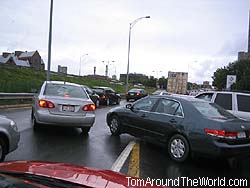 |
Originally, we were to spend the night in Boston with my friend Jeremy, but he was in New York City. So, I called my sister Barbara and asked if she would put us up for the night. She said it would be no problem. She gave me directions and we told her we would see her around midnight and would call her if we got lost or changed plans. |
|
We ended up cutting off some bitch in a silver car and she flipped us off. Oh well… "When in Rome…" they say. Soon, we were cruising down the streets of Boston searching for the club. But, the Mass Transit Authority has all the streets going one way and many of the cross streets are not marked at all. I will admit we got a little bit lost. We drove around for a short time looking for any sign of where we might be. After a while, we saw a group of Punk kids and we pulled over and asked them if they knew how to get to the club called Axis. As luck would have it, they were going to the Stiff Little Fingers show as well. |
|
They dropped the knowledge on how to get there and moments later, Dawn and I were parked in a garage across the street from the club. The parking garage was directly next door to Fenway Park, which is the Home of the 2006 World Series Champions: Boston Red Sox. It cost us ten dollars to park for the night, which seemed a bargain compared to the thirty dollars it cost to park in the same garage for a Red Sox game. |
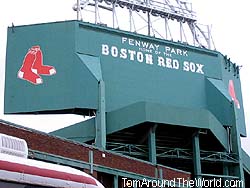 |
|
Located at 13 Lansdowne Street in Boston, Axis caters to a lot of different aspects of Boston nightlife.
The split-level, split-personality nightclub offers House Music on two dance floors in a predominately punk setting. It has a raw, unvarnished feel as opposed to slick, polished uber-clubs. Axis is multi-purpose venue and regularly plays host to both the world's top DJ talent as well as the local popular touring rock acts. A wide variety of live bands kick things off most nights, and you’re likely to hear everything from punk to indie to metal and more. The venue features performances by live bands in the earlier part of the night. Often referred to as the city's underground dance club, Axis is in a class of its own. A killer sound system starts thumping as soon as the bands play their last encore (usually around 9:30PM). That's when black lights start to pulsate and glow-sticks begin twirling through the darkness as DJs spin an eclectic mix of hip-hop and R&B. When we got inside, the place was packed. There were a lot of younger kids there to check out the legendary Punk band that influenced their new heroes, as well a a large number of the "old gaurd" Punks that grew up listening to the rantings of the boys from Belfast. A feeling of electricity permeated the interior of the club. The crowd was ready to rock! |
|
With drinks in hand, we walked out onto the club's terrace area where everyone was smoking and got some air before heading inside again. |
| Prior to becoming Stiff Little Fingers, Jake Burns (Vocals and Guitar), Henry Cluney (Guitar), Gordon Blair (Bass), and Brian Faloon (Drums), were playing in a Deep Purple cover band: Highway Star. Gordon Blair left the band and Ali McMordie took over the duties on Bass. Blair went on to play with another Belfast group called Rudi.
After being introduced to Punk Rock, the band changed their sound and decided they needed a more "Punk-sounding" name. The band took their name from the b-side of The Vibrators "London Girls" single… "If it wasn't for your stiff little fingers nobody would know you were dead." The band's clever logo is two up-thrust fingers, which in Europe has a few meanings. The first is the "V for Victory" and the other is the same thing as giving someone "the Finger." Choosing that for a logo was a brilliant move on many levels… In November of 1977, Gordon Ogilvie, a local journalist, caught their live show (which consisted mainly of covers of other bands' songs) and was impressed. He encouraged them to write their own songs about what they knew best: life in Belfast. Jake came back two weeks later with the songs, "Wasted Life" and "Suspect Device." Both are fiercely passionate songs dealing with the brutal reality of growing up in the focal point of two decades of violence in Northern Ireland. SLF released the songs on their own Rigid Digits label, with an initial pressing of only 350. The songs were the first of what was to became SLF's signature style: lyrics that connect the personal and political, music that combines the power of Punk with infectious hooks, and a delivery that rings of truthfulness and commitment. A copy was sent to BBC Radio One DJ John Peel, who started playing it every night. The interest generated resulted in a distribution deal through England's Rough Trade, a chain of record stores with its own record label. A fanzine called Alternative Ulster asked the band to write a song for a giveaway flexi-disc. Although the plans for the flexi fell through, the song "Alternative Ulster" became the first single released by Rough Trade in October of '78. It became an instant Punk rock classic. In the fall of 1978, SLF toured the UK supporting the Tom Robinson Band. Robinson was the first openly Gay singer of the time, and had recorded with Café Society. The tour got SLF loads of enthusiastic press and the band gathered a solid following. |
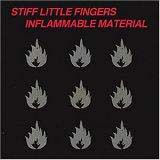 |
As a result of the positive press and regular airplay by DJ John Peel, the now legendary Inflammable Material LP debuted in the UK charts at #14. It is an excellent album, though somewhat badly produced, as were most Punk records of that time… (Studio techs just didn't know what to do with the new Punk sound.) The album chronicles the band's anger and frustration at the troubles in Northern Ireland, and calls on youth to create their own reality. The unkind would say that much of Stiff Little Fingers best work was ripped off from others. "Suspect Device" sounds remarkably similar to Montrose's "Space Station # 5" and the band were sued because of it. The riff from "Alternative Ulster" is supposedly lifted from a Bob Marley tune and "78 R.P.M." borrows from Belfast neighbor Rudi's song: "Big Time." Truthfully, I really don't give a shit if they did steal the riffs... It's not like others have never done it. Every genre of music has people that steal, "borrow," or sample from others. Just look at the Blues and Hip Hop, many of the greatest performers used the same riffs as others but made the lyrics their own. Suspect Device is still a powerful and great song that still gives me goosebumps and, in the end, that's what really counts, right? The lyrics to the song are just as valid today as they were when it was written. (Personally, I think some band should do a new cover version of the song and do a video using footage of George Bush and all his cronies…) |
| In 1979 the band moved to London. Brian Faloon decided not to go and was replaced by Jim Reilly. In the spring of the same year, SLF played with The Clash and many others on the Rock Against Racism tour. The Rock Against Racism movement was founded in England in the late 1970s by a group of musicians and political activists. At that time there had been an increase in racial violence and xenophobia, which was fuelled by the rise of the National Front, a neo-Nazi political party. By the summer of 1979, SLF signed a deal with Chrysalis Records, which included unusually broad artistic control by the band. They released the LP Nobody's Heroes in 1980. It combined the Do-It-Yourself ethic of the first album with more universal themes of alienation, anti-militarism, and anti-racism. The Go For It LP in '81 revealed more sophisticated songwriting and musicianship, and another step in the shift from punk to power pop. Soon after the Go For It tour, Jim Reilly left the band and was replaced by Dolphin Taylor, former drummer for the Tom Robinson Band. The Now Then album of '82 alienated many of SLF's punk followers with its pop sound, and despite some glowing reviews, never got the recognition it deserved. In a musical rut, continually haunted by the Clash comparisons, and with punk rock running out of steam, Burns pulled the plug on SLF. The band split in early '83. But they only remained apart for five years. During the five years they spent apart, each member pursued musical projects, but none were as satisfying or as successful as Stiff Little Fingers. During this period, Jake formed the band Jake Burns and The Big Wheel which released three singles and one full length album titled: On Fortune Street. Around that same time, Burns also worked a short stint as a BBC Radio producer. In 1987 Jake got a phone call from Ali, asking if he wanted to go to a reunion gig by the Tom Robinson band. Jake couldn't go to the gig, but the call led to SLF eventually playing a few reunion shows, partly as an inexpensive way of returning to Belfast to see their parents at Christmas time. Audience response to the reunion shows was overwhelming; with sell-out crowds larger than any that SLF had played in their original incarnation. They played two shows at the Brixton Academy in '88 and drew in over 10,000 people for the two nights. Fans from the U.S., Japan, Switzerland, and elsewhere flew in to see them. Recordings from those shows were released as the See You Up There album and video, considered by many to be the best SLF live recordings ever. The response to the shows surprised the band, and their following continued to grow, with younger "new" fans showing up alongside the old diehards. By 1990 Jake Burns' thoughts had turned to reforming the band permanently and recording new material. Ali's commitments would keep him from recording an album or touring and he officially left about a week before the tour of Japan. Jake phoned Bruce Foxton, formerly of The Jam, who jumped in at the last moment. Bruce remained a member until the spring of 2006. The Flags and Emblems LP was released in 1991 and featured the single "Beirut Moon." It was immediately banned in Britain. The song criticized the British government for not acting to free hostage John McCarthy in Lebanon. (Bonus History Lesson: McCarthy, a British journalist, was abducted in April 1986 along with eleven other Westerners that were held captive by the Islamic Jihad militant group. After five years, McCarthy's release was the first in a series of releases in 1991, which resulted in freedom for nearly all the Westerners held captive in Lebanon. In spite of a public refusal to pay ransoms, some countries like the US, France, and Germany were believed to have secretly paid large sums of money or exchanged weapons for the release of their nationals. And now, back to the story…) Although Flags and Emblems was not as strong as earlier albums, it still served to satisfy fans starved for new SLF songs, and the ensuing tour continued the tradition of great live shows. In 1993 Jake asked guitarist Henry Cluney, (whose life was out of control), to leave the band. The trio of Jake Burns, Bruce Foxton, and Dolphin Taylor continued, for the next four years, joined on tour by guitarists Dave Sharp or Ian McCallum. In '94 they released the Get a Life LP in the UK, and it was released in the US in '95. The album helped renew interest in SLF just as newer bands that sited them as a major influence, such as Bad Religion, Sugar, Rancid, and Therapy, were coming to prominence. At the end of '96 Dolphin Taylor left the band, due to family and business obligations. The new drummer was Steve Grantley, who was the drummer for Jake Burns and the Big Wheel. Ian McCallum joined permanently on guitar, balancing SLF tours with solo recordings and performances. |
| SLF released the studio album, Tinderbox in '97 and toured extensively throughout that year to promote it. Stiff Little Fingers released the studio album Hope Street in two different formats in 1999. The UK release on EMI is packaged with a special The Best Of All CD; containing re-mastered classic cuts from the band's entire back catalogue. The North American release on King Biscuit/Oxygen includes a second live CD, from the Newcastle Riverside concert from September '98. The song "Last Train From The Wasteland" is the first optimistic song Burns had ever written about Belfast. The mood of the Hope Street album is generally more positive than most of the SLF material from the past. In 1999 also SLF released a live CD of all new live material, titled Handheld and Rigidly Digital, available exclusively on the band's Web site and at SLF gigs. Much of the material was recorded at a special Hope Street Premier Party held in London, at which the band played over two hours of new songs, rarities, plus all the favorites. Four years later in August of 2003, Stiff Little Fingers released their ninth studio album, Guitar and Drum, which includes a moving tribute to Clash frontman Joe Strummer, entitled "Strummerville." |
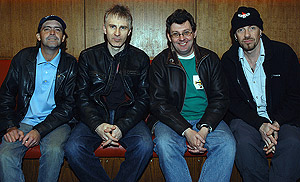 |
| In 2006, Bruce Foxton left Stiff Little Fingers amicably, and original bassist Ali McMordie returned after 15 years. Response from the fans has been tremendous. Though focused on their new material, they always play the old favorites at gigs. Burns believes that SLF must strike a difficult balance. The band needs to be fresh and relevant, yet still retain a dose of the past, but not so much that it becomes like a nostalgia band. There are nights that the band doesn't particularly want to play "Alternative Ulster" or "Suspect Device" because they've played them a million times. But there's always the possibility that somebody out there has never seen SLF before and never heard the songs played live. |
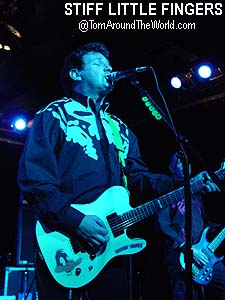 |
I was one of those people; and after seeing them on the opening night of the their first tour of the United States in many years, I must say it was fantastic! |
|
I explained to him that I found out they were opening for SLF and looked them up. What I heard, I liked and had been looking forward to seeing them play live. I let him know that I was not disappointed in any way. As we spoke, the tour manager came to take Dawn and I upstairs to the VIP area. When we got there, the members of Stiff Little Fingers, as well as family, fans, and friends, were hanging around drinking beers and eating. Jake offered us beers and some chicken fingers. We grabbed a few beers and got down to the interview. |
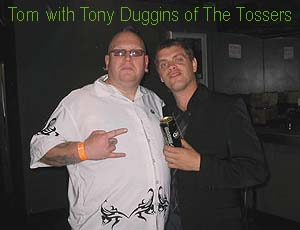 |
|
It had been a great day. |
 |
|
|
| Home | Events | Donations | GuestBook | Email Login |
|
|
 |